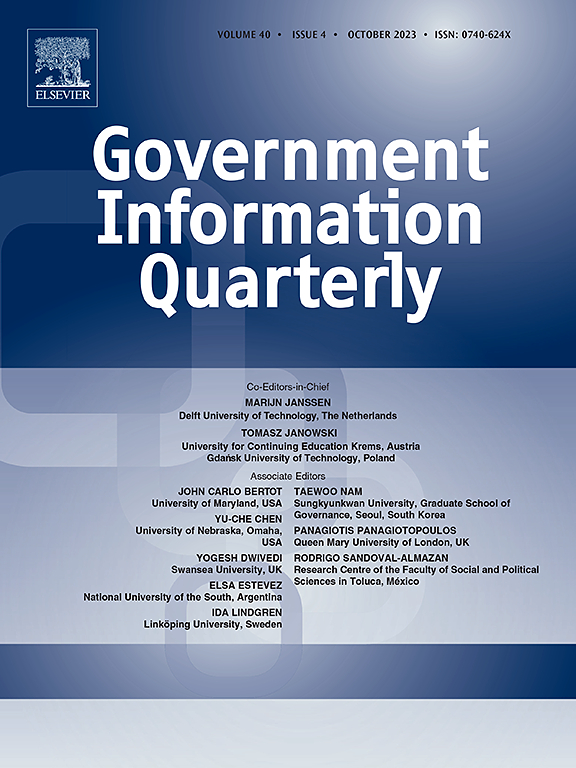Determinants of open government data continuance usage and value creation: A self-regulation framework analysis
IF 10
1区 管理学
Q1 INFORMATION SCIENCE & LIBRARY SCIENCE
引用次数: 0
Abstract
In the era of the digital economy, open government data (OGD) has emerged as a pivotal driver of socio-economic innovations. Despite its transformative potential value, research remains scarce on the antecedents and value creation of OGD usage in the post-adoption stage, where sustained engagement determines long-term success. To address this gap, our study investigates the determinants of users' continuance usage of OGD and its cascading impact on value creation. Leveraging Bagozzi's self-regulation framework, we integrate the DeLone and McLean's model (D&M model) and the democratic e-governance website evaluation model (DEWEM) to develop a comprehensive theoretical lens that disentangles the roles of website functionality (e.g., transparency, citizen engagement) and data quality (e.g., accessibility, completeness). Empirical data was collected from 267 skilled OGD users in China and analyzed via PLS-SEM. The results show that user satisfaction and perceived value jointly drive continuance usage, with user satisfaction predominantly shaped by information suitability, transparency, security, and citizen engagement. Notably, data accessibility plays a foundational role in enhancing perceived value, whereas data completeness and timeliness show unexpected non-significant effects. Crucially, continuance usage of OGD directly amplifies users' net benefits and trust in governments, underscoring OGD's dual value proposition. These findings contribute to the theoretical understanding of post-adoption behavior in OGD and provide practical insights for policymakers to optimize platform design, prioritize high-impact data features, and foster sustainable OGD ecosystems.
开放政府数据持续使用和价值创造的决定因素:自我监管框架分析
在数字经济时代,开放政府数据(OGD)已成为社会经济创新的关键驱动力。尽管具有变革性的潜在价值,但在采用后阶段,关于OGD使用的前提和价值创造的研究仍然很少,在这个阶段,持续的参与决定了长期的成功。为了解决这一差距,我们的研究调查了用户继续使用OGD的决定因素及其对价值创造的级联影响。利用Bagozzi的自我监管框架,我们整合了DeLone和McLean的模型(D&;M模型)和民主电子政务网站评估模型(DEWEM),以开发一个综合的理论视角,理清网站功能(例如,透明度,公民参与)和数据质量(例如,可访问性,完整性)的角色。从中国267名OGD熟练用户中收集实证数据,并通过PLS-SEM进行分析。结果表明,用户满意度和感知价值共同推动了持续使用,用户满意度主要由信息适用性、透明度、安全性和公民参与度决定。值得注意的是,数据可及性对感知价值的提升起基础性作用,而数据完整性和时效性则表现出意想不到的非显著效应。至关重要的是,OGD的持续使用直接扩大了用户的净收益和对政府的信任,强调了OGD的双重价值主张。这些发现有助于从理论上理解OGD采用后的行为,并为政策制定者优化平台设计、优先考虑高影响力数据特征和培育可持续的OGD生态系统提供实践见解。
本文章由计算机程序翻译,如有差异,请以英文原文为准。
求助全文
约1分钟内获得全文
求助全文
来源期刊

Government Information Quarterly
INFORMATION SCIENCE & LIBRARY SCIENCE-
CiteScore
15.70
自引率
16.70%
发文量
106
期刊介绍:
Government Information Quarterly (GIQ) delves into the convergence of policy, information technology, government, and the public. It explores the impact of policies on government information flows, the role of technology in innovative government services, and the dynamic between citizens and governing bodies in the digital age. GIQ serves as a premier journal, disseminating high-quality research and insights that bridge the realms of policy, information technology, government, and public engagement.
 求助内容:
求助内容: 应助结果提醒方式:
应助结果提醒方式:


